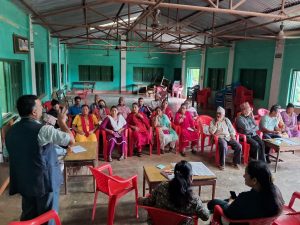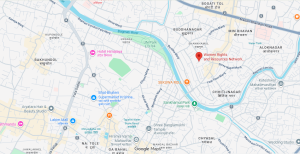 The training on governance, gender issues, GESI leadership and roles and responsibilities to Community Forest User Groups (CFUGs) based on the RBA plan developed was conducted on October 4 and 5, 2025 in Piple Pokhara CFUG. The training in Piple Pokhara CFUG was conducted for two days where first day emphasized on the clarification of terms and the content deliverables whereas second day focused on Right Based Advocacy (RBA) Plan preparation. The training was developed based on the Right-Based Advocacy (RBA) plan, which aims to enhance community engagement and promote sustainable forest management practices.
The training on governance, gender issues, GESI leadership and roles and responsibilities to Community Forest User Groups (CFUGs) based on the RBA plan developed was conducted on October 4 and 5, 2025 in Piple Pokhara CFUG. The training in Piple Pokhara CFUG was conducted for two days where first day emphasized on the clarification of terms and the content deliverables whereas second day focused on Right Based Advocacy (RBA) Plan preparation. The training was developed based on the Right-Based Advocacy (RBA) plan, which aims to enhance community engagement and promote sustainable forest management practices.
Day 1
A total of 34 participants attended the training, including members from the Executive Committee, the Enterprise Group, representatives from the Women Rights and Resource Network (WRRN), and facilitators. The session began with an introductory segment led by Mrs. Kabita Gaire, who outlined the purpose of the gathering and provided an overview of the various sessions planned for the day.
Following this outline description session, each participant introduced themselves in an introductory session, helping to set a collaborative tone before formally beginning the program. Ms. Aarati Pathak then took the floor to discuss the core themes of Good Governance, Gender Inclusiveness, and Leadership Development. She explained these concepts in detail, emphasizing that “Good governance fosters transparency, accountability, and inclusiveness in decision-making, ensuring that economic policies support sustainable environmental and social outcomes along with economic development”. This set a strong foundation for the day’s discussions on how effective governance and inclusive practices can lead to sustainable community development.
The training officially commenced with Mr. Ghanshyam Pandey, facilitator of the program, introducing the essential idea of good governance in community forest management. He explained that good governance means being transparent, accountable, inclusive, and sticking to legal guidelines, ensuring everyone in the community has a say and knows what’s happening. Mr. Pandey stressed that these principles are crucial for effective forest management and bringing long-term benefits to the community.
We dove into each principle of good governance, starting with transparency. Participants learned the importance of open communication within Community Forest User Groups (CFUGs), especially around financial matters. This included openly sharing details like income from timber sales and budgets so that all members understand where funds go and trust the process. Next, we explored accountability, discussing that each CFUG member has roles and responsibilities and should be prepared to explain their actions to the group. Leaders are especially encouraged to regularly update everyone on their activities to align with the community’s interests. Inclusiveness was another key focus. Everyone, especially women, marginalized groups, and indigenous peoples, should have a voice in decision-making. While discussing on the topic, participants identified barriers that may prevent these voices from being heard and brainstormed ways to make CFUGs more welcoming.
The session also included a review of the 31 rights guaranteed by Nepali policies, emphasizing their relevance to CFUGs. Mr. Pandey highlighted the need for equilibrium between rights and responsibilities, stressing that while rights empower individuals, responsibilities ensure sustainable and equitable outcomes.
During the discussion on gender issues, Mr. Pandey shared a thought-provoking example from abroad, where men are facing challenges regarding child custody rights during divorce proceedings. He highlighted how, in many cases, mothers are given preference over fathers when it comes to custody, prompting men to form advocacy groups to challenge these laws. Mr. Pandey emphasized that discrimination exists everywhere, though it takes on different forms depending on the context.
The conversation then shifted to the unique challenges women encounter in Community Forest User Group (CFUG) activities. Many participants shared personal stories, shedding light on the barrier women face, such as limited decision-making power and cultural biases. Together, we brainstormed practical solutions to foster inclusivity and ensure that CFUG activities become a space where everyone, regardless of gender, can participate equally and meaningfully.
After the session, we were engaged in a discussion with the participants about the identified issues within the respective CFUG
By the end of the day, participants had a stronger understanding of how good governance principles can be applied within their CFUGs to improve decision-making processes and promote social equity in forest management.
DAY-2
On the second day of training, we turned our attention to Gender Equality and Social Inclusion (GESI) leadership and the roles and responsibilities of CFUG members. Ms. Aarati Pathak led the session, kicking things off with an engaging activity. Participants listed household tasks typically performed by men and women over a 24-hour period. It was striking to see how much more work women often shoulder, yet they still find ways to participate in self-development and community activities. This realization sparked meaningful conversations about the often-overlooked contributions of women and the need to value their efforts more openly.
The session highlighted the essence of strong, inclusive leadership—ensuring that everyone, regardless of gender or social status, has their voice heard and their perspectives valued. Ms. Pathak shared powerful examples of leaders who have successfully embraced diversity within their CFUGs, inspiring participants to reflect on their own practices. Participants discussed challenges and shared ideas on how to empower women and marginalized groups to step into leadership roles. Practical suggestions, such as mentorship programs and rotating leadership opportunities, emerged as promising solutions to make leadership more accessible and inclusive.
We also explored the specific responsibilities of CFUG members, focusing on sustainable forest management, monitoring resource use, and implementing conservation strategies while ensuring compliance with legal frameworks. The discussion emphasized the importance of inclusive decision-making in these processes, highlighting how diverse perspectives can lead to better outcomes for the community and the forest. Participants shared insights on their roles and responsibilities, deepening their understanding of how to balance conservation efforts with equitable resource use within their CFUGs.
By the end of the day, the room was filled with a sense of purpose and optimism. Participants left feeling more equipped to lead with inclusivity in mind, inspired to build stronger, more equitable communities through their CFUGs.


